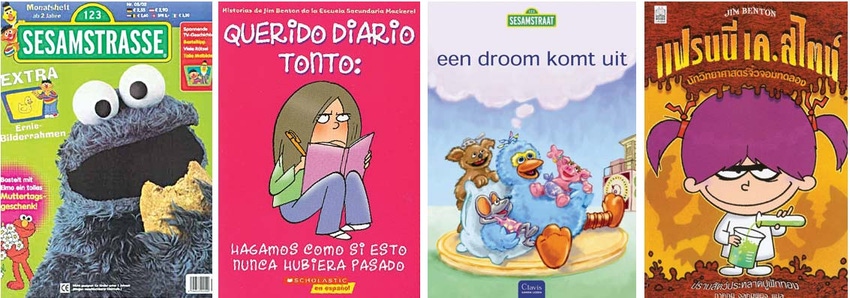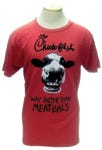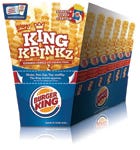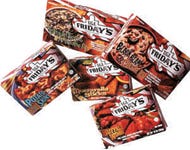]> Continuously looking for incremental sales, the fiercel
April 6, 2018

]>
Continuously looking for incremental sales, the fiercely competitive chain restaurant industry is licensing branded food items and other products in supermarkets and mass merchandising channels at a pace and volume never before seen. 
Once a gimmicky point of distribution for exposing the brand or logo on products in high-traffic, non-foodservice arenas, restaurant brand extension programs are multiplying in virtually every menu category. Among some of the aggressive participants are Chick-fil-A, Burger King, Checkers/Rally's, IHOP, Cold Stone Creamery and Macaroni Grill. 
As logical as it is lucrative, chain executives and licensing experts predict the licensing of restaurant trademarks on frozen dinners, snacks, ice cream, spices, toys, clothing and even plush in general merchandise and grocery stores will only grow as the recession loosens its stranglehold on consumers' wallets.
It is even creating some strange merchandise pairings in which restaurant brands will be attached to foods and other products with no connection to the brand's heritage. 
That's the case with the partnership involving The Valen Group, a Cincinnati-based licensing agency, and the 51-year-old, 1,280-unit IHOP breakfast chain based in California. Valen announced in early May the launch of a line of IHOP-inspired lip balms for tweens under the Lotta Luv logo and toy food sets by Boley Manufacturing, of California. Valen is also exploring options for a line of candy that would be based on the brand equity of IHOP's proprietary label, Rooty Tooty Fresh N' Fruity.
"The avenues of channel blurring do not exist in the mind's eye of consumers anymore because they shop very differently than they did 20 years ago," says Steven Johnson, who writes about brand extension at his Wall Street-followed blog, Grocerants (grocerants.blogspot.com).
"Here's the fun part," Johnson continues. "You go to a Costco and get in the checkout line and in front of you is a shopper with a ladder, a couple of T-shirts and underwear, a movie DVD, fresh vegetables, some steaks, a bottle of wine and a prepared ready-to-eat meal, all in the same cart. What that example says is that in this Internet age when consumers don't even have to leave home, restaurant marketers have to put their brands wherever their guests go." 
White Castle hamburgers, Nathan's Famous hot dogs and T.G.I. Friday's potpourri of drink mixes, recipe books and bar decorations have a long history of an array of licensed product on store shelves and a host of other restaurant chains have followed suit, including:
Potato chips, condiments and an assortment of microwavable French fry cuts bearing Burger King's logo can be found in club stores and supermarkets around the country.
With more than 500 units, the Mrs. Fields cookie chain has teamed up with Klondike bar for a dual-branded ice cream sandwich, now in its seventh year of licensing in supermarkets and club stores.
Dallas-based Brinker International's Italian dinner house concept, Macaroni Grill, has assigned a third-party manufacturer to license a line of frozen Italian dishes, featuring the chain's signature lasagna.
In addition to the non-traditional lip balms and toys IHOP is developing, the family dining chain is also reportedly seeking a partner for a line of ice cream or frozen novelties that may go under the Rooty Tooty Fresh N' Fruity brand.
Lauded for its quirky taglines to encourage poultry consumption—the most renowned of which is "Eat mor chikin"—the 1,800-unit, Atlanta-based Chick-fil-A sandwich chain has stuffed teddy cows, T-shirts, aprons and trucker caps with that slogan and other funny tags for sale at specialty and club stores.
Checkers Drive-In Restaurants, the Tampa, Fla.-based operators of the 800-unit Checkers and Rally's drive-through burger brands, has contracted with IMC Licensing of Louisville, Ky., to license its signature burgers and fries to the grocery store channel.
Jamba Juice, celebrating its 20th anniversary, named Julie Washington vice president of consumer products, licensing and growth initiatives. With more than 730 units, Jamba Juice already has a licensing program with such partners as Think Wow Toys (toy blender), Oregon Ice Cream (frozen novelty products), Headline Entertainment (apparel) and The Inventure Group (frozen smoothie kits).
"Growth of CPG and licensing are among Jamba's key priorities as we evolve from a made-to-order smoothie company to an active, healthy lifestyle brand," says James D. White, president and chief executive officer at Jamba Juice. 
In what might be the wackiest licensing deal of all, White Castle has rolled out a line of scented candles that smell like its burgers. Laura Slatkin of the specialty retailer Nest Fragrances helped the chain develop the scent and told the New York Daily News her entire inventory of White Castle-scented candles sold out in 48 hours.
Foodservice marketing consultant Johnson, who originated and copyrighted the word Grocerant and is principal behind the marketing consultancy Foodservice Solutions of Tacoma, Wash., has 20 years experience as a franchisee and operations executive of such brands as T.G.I. Friday's, Fuddruckers and Wienerschnitzel.
"If you are a major marketer of a restaurant brand and your products or logos are not in the face of shoppers at Walgreens, Target, 7-Eleven or Costco, then you are losing money," he says. "It's all about brand momentum and building the brand by extending it. So, alternative points of distribution are only logical."
Cold Stone Creamery, the Scottsdale, Ariz.-based operator of 1,450 premium ice cream parlors, is another prominent brand rolling out hardlines merchandise. It has teamed up with Global Icons and Think Wow Toys launching a line of ice cream makers.
Bill McClinton, a principal with Global Icons, says licensing products or foods that are not well-known brand identifiers can be risky for some. For others, such licensing marriages can be heaven-sent, he argues.
"Sometimes licensed products cannot replicate what's actually offered in restaurants, so the company needs to create inspirational products that translate the same or similar customer experiences when actually at restaurants," McClinton says. "For example, part of the novelty of Cold Stone Creamery is in the in-store-employee ice-cream-creation-making process. A Cold Stone Creamery toyetic [sic] ice cream maker allows consumers to experience the same joy of creating their own ice cream creations at home." 
Dismissive and skeptical about the rewards of merchandising licensed goods that have nothing to do with a restaurant chain's heritage concept or menu profile, Bill Cross, vice president of Broad Street Licensing Group's Montclair, N.J. office—BK's licensing agent for its microwavable French fries and potato chips—argues that chains that invest in non-food merchandise or off-the-wall food products are wasting time and money.
"I think these tchotchkes are nonsense," Cross says. "They are just promotional products that put the brand image out there, but there's no real money to it and they do little to enhance brand value.
"We've worked with the Culinary Institute of America to do a line of house and kitchen wares, but in that case, it makes sense. The real money and impact for a restaurant chain is having branded food products in grocery stores."
Janna Markle, vice president of licensing at The Valen Group, the agents ushering IHOP into numerous brand extensions and who spearheaded T.G.I. Friday's efforts into alternative points of distribution back in the late 1990s, says no matter the state of the economy, licensing is low-hanging fruit that savvy operators should not ignore.
"Although it typically takes 18 months to get a licensing program off the ground and have products in the marketplace, the revenue stream from licensing goes straight to the bottom line with very little overhead, unlike running a restaurant," Markle says.
Markle does concede that franchised restaurant chains sensitive to their franchisees' allegations of territory encroachment through retail merchandising might have different thoughts about brand extension.
"There is always the concern about franchisees that clouds any decision to license a brand," she observes. "It has been proven over and over that licensing a brand in retail grocery is accretive to the brand, but franchisees still have concerns that have to be managed."
Although some chains' franchisees have grumbled when their franchisors license the brand in nearby retail outlets, Stu Seltzer of Marketing on Demand in New York, whose company has the Mrs. Fields/Klondike bar dual-branded ice cream product, says some other franchisees see the upside of having licensed product in a supermarket.
"The Mrs. Fields company and franchisees view this as a win-win since they know that if the consumer wants the fresh-baked-cookie—the core product—they will buy it from the Mrs. Fields stores," Seltzer argues. "They can look at this as a huge [revenue producing] advertising program."
The Brand Licensing Team, led by former senior marketing executives for Coca-Cola—Cindy Birdsong and John Shero, managing partners—is licensing Chick-fil-A's funny taglines on an assortment of non-food merchandise. The company intends to target Kohl's, Hallmark, Walgreens, Rite Aid, Target and Saks with not only Chick-fil-A-licensed products, but other brands' logos as well, on holiday ornaments, plush stuffed animals, apparel, even items to make a tailgate party go better.
Shero says the catchy and humorous pleas from cows begging humans to eat more chicken resonate with consumers because of Chick-fil-A's core brand strengths.
"There is a risk to licensing products that are not strategically aligned with the efforts and the marketing focus of that brand," Shero contends. "But when we look at licensed articles, we want to make sure they align the brand's positioning and marketing approach. We would never do a product that made no sense [to us] because it won't make any sense to the consumer as well.
"Our approach is being very, very focused on what the brand is doing and bringing product to market and making sure it is well designed."
With no immediate plans to license a branded menu item, Steve Nedvidek, senior manager of brand activation for Chick-fil-A, says the toys, T-shirts and plush cows the chain has licensed through retail channels is not to grow sales, but to bring wider exposure to the brand.
"Because we are just now cracking the door on licensing our products and names, we are going to be pretty measured about what we will do with our food," Nedvidek says. "We don't want to do anything negative that affects our franchise operators, and we don't want to water down the brand.
"But for us, it's a brand play," Nedvidek continues. "It's brand awareness; not a way to increase sales. We've sold 600,000 cows, countless 'Eat mor chikin' Pez dispensers. It's cute. Customers enjoy the cow campaign."
You May Also Like






